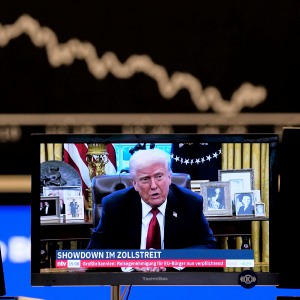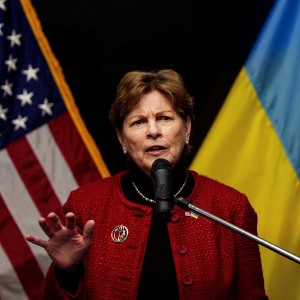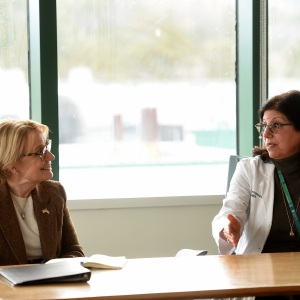Column: Trump gets it wrong on foreign aid
| Published: 03-28-2025 5:55 PM |
I served my country for almost 40 years, not in uniform but with the United States Agency for International Development (USAID), the agency that managed 60% of our humanitarian and development assistance. I have hundreds of on-the-ground examples of how USAID employees served America’s interests. (Over the agency’s six decades of work, 99 USAID staff gave their lives in service to their country.)
The Trump Administration’s abrupt and uninformed assault on foreign aid is making America less safe, less prosperous and weaker in the eyes of the world. Secretary of State Marco Rubio recently announced his decision to cancel 83% of USAID’s programs, saying they did not serve US national interests.
As a retired career Foreign Service Officer who has lived and worked across Africa, Asia and the Middle East, I know from experience that Rubio is wrong.
The Trump Administration seems to filter every decision by asking “What’s in it for us?” The answer for foreign aid is “plenty.” And the US taxpayer gets a big bang for a few bucks. In fact, foreign aid accounts for less than 1% of the federal budget.
And what do we get? Let’s look at just the direct and economic benefits. The direct impact: at least 50,000 American jobs in business, universities and nonprofits; some $2 billion dollars of food purchased from American farmers and shipped on American vessels. Second, and more important, our aid helps create business climates friendly to US trade and investment and gives US businesses valuable entry points to new markets.
For instance, in Rwanda, a US firm was awarded a small USAID contract to conduct a feasibility study for upgrading Kigali’s water system. The city awarded the same firm a $28 million contract to design and build the system. The American firm now works in over 10 African countries with over $100 million in contracts.
Another example: Power Africa, a USAID-led public-private partnership to expand access to electricity in Africa, used $1.2 billion to make deals in power generation and distribution for over 100 US firms worth $29 billion. Another $21 billion in deals were in the pipeline before the program was shuttered.
In losing USAID’s ability to leverage such resources, we are leaving the playing field to China, Russia and others. The potential for American businesses is great. Africa’s 49 countries imported $32 billion of US goods in 2024, up 11% in one year. Twelve of the top 20 fastest-growing economies in the world are in Africa. It is in America’s interest to spend a few bucks for huge economic benefits.
Article continues after...
Yesterday's Most Read Articles
 Upper Valley residents turn out in droves for protests against federal policies and cuts
Upper Valley residents turn out in droves for protests against federal policies and cuts
 Kenyon: DH CEO asserts decision to close infertility program was ‘thoughtfully evaluated’
Kenyon: DH CEO asserts decision to close infertility program was ‘thoughtfully evaluated’
 A Look Back: Catamount Brewing remembered as ‘a pioneering kind of venture’
A Look Back: Catamount Brewing remembered as ‘a pioneering kind of venture’
 High school soccer: As Grabill heads to Sunapee, Richardson takes over Hanover vacancy
High school soccer: As Grabill heads to Sunapee, Richardson takes over Hanover vacancy
 NH lawmakers want to study the possibility of leaving New England’s electricity system
NH lawmakers want to study the possibility of leaving New England’s electricity system
 ‘The revenue just isn’t there’: House Finance Committee slashes $271M in jobs, services from Ayotte’s budget proposal
‘The revenue just isn’t there’: House Finance Committee slashes $271M in jobs, services from Ayotte’s budget proposal
Foreign aid also makes us safer. Hunger, extreme poverty and insecurity make desperate people more susceptible to extremist ideologies and drive illegal migration. USAID’s programs help people to feed themselves, create economic opportunities, and give people a chance for a normal life. Yet Secretary Rubio has terminated lifesaving aid for millions of people fleeing conflict and canceled law enforcement programs that help apprehend terrorists and protect civilians.
Controlling infectious diseases also makes us safer. As we learned from the COVID-19 pandemic, diseases do not respect borders no matter how tightly controlled. When Ebola broke out in West Africa, USAID’s investments in health systems and trusted relationships with health authorities stopped the spread within and between countries. Today, there is an Ebola outbreak in Uganda and, contrary to White House claims, US support for Uganda’s control efforts was cut off and has not been reinstated. Further, USAID’s work to curb the spread of highly contagious tuberculosis (TB) and monitor the rise of new diseases has been terminated.
If you don’t believe me, believe the long list of US military leaders who understand that foreign aid is an essential — and cost-effective — complement to military might. Gen. Anthony Zinni stated “countering the threats to our nation requires comprehensive responses that utilize all our elements of national power — military and non-military. An indispensable part of the non-military toolkit is foreign aid – one of the least appreciated and yet vital means for advancing America’s interests around the world.”
What needs to be done? Tell your Congressional delegation that they must insist that the Trump administration restore the development and humanitarian programs that make America safer, stronger and more prosperous.
Jim Bednar is a retired USAID senior officer who served in Mauritania, Swaziland, and became country director of assistance programs in the Czech Republic, Morocco, Zambia and Sri Lanka. He also was country director in Ghana for the Millennium Challenge Corporation, another US government foreign assistance program created by President George W. Bush. Most recently, he worked in Jordan, Rwanda and the Democratic Republic of the Congo. He lives in Springfield N.H.






 Editorial: Time is running out for American democracy
Editorial: Time is running out for American democracy Editorial: Jeanne Shaheen blazed a trail in politics
Editorial: Jeanne Shaheen blazed a trail in politics Column: Federal funding for medical research puts America first
Column: Federal funding for medical research puts America first Editorial: MLB resumes all-American pursuit of new billions
Editorial: MLB resumes all-American pursuit of new billions
